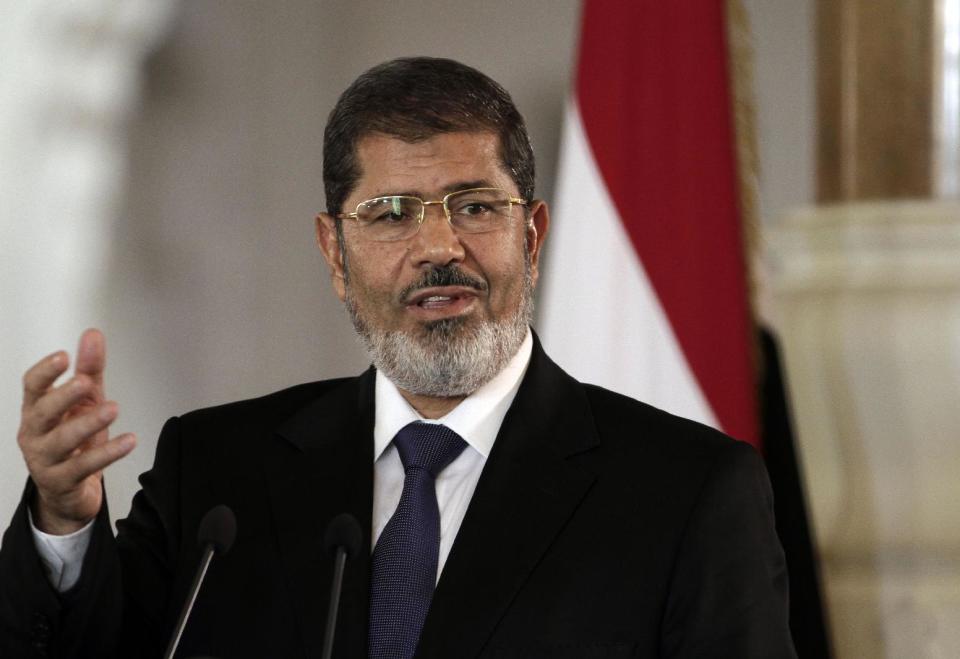Ousted Egypt leader arrives at prison break trial

CAIRO (AP) — Egypt's toppled President Mohammed Morsi has arrived in Cairo for start of his trial Tuesday over charges he and some 130 others face for prison breaks during the country's 2011 revolution, the state news agency reported.
MENA reported that Morsi flew by helicopter from Borg al-Arab prison in Alexandria. Only 19 other of the 129 defendants in the case, including the leader of Morsi's Muslim Brotherhood group and other leading figures, are held by authorities. The rest, including members of the Palestinian militant group Hamas and Lebanon's Hezbollah, are on the run.
The case is rooted in the 2011 escape of more than 20,000 inmates from Egyptian prisons — including Morsi and other Brotherhood members, during the early days of the 18-day uprising against ousted President Hosni Mubarak in 2011.
Authorities accuse Morsi and the other defendants of plotting to "destroy the Egyptian state and its institutions," conspiring with the foreign groups who infiltrated to Egypt through Gaza and using the turmoil during the uprising to organize the prison breaks. The prosecutors said more than 800 foreign fighters entered Egypt through Gaza to take part in storming of three prisons and killed a number of police officers and inmates.
A Brotherhood lawyer has said the trial appears aimed at "denigrating" Morsi and the Brotherhood.
It is Morsi's second court appearance since Egypt's popularly backed July 3 military coup. He missed a Jan. 8 hearing in another trial after security officials said bad weather grounded a helicopter meant to bring him.
The hearing will be held at a police academy complex in eastern Cairo, where a heavy security presence stood guard Tuesday. State television showed live footage from inside the courtroom, the first time for airing the proceedings of Morsi and Brotherhood officials live.
Morsi is facing three other trials on different charges as well. Only one of those trials, where he is accused of inciting murder of his opponents while in office, has begun. Many of the charges he faces carry the death sentence.
In his first appearance, Morsi insisted he was still the country's legitimate president and challenged the legitimacy of the court, regularly interrupting the judges and prosecutors.
At Tuesday's trial, authorities have put up a glass window over the metal cage typically housing defendants, apparently to control the defendants' interruption of the judges.
Since Morsi' ouster in July 3 in a popularly backed military coup, hundreds of senior Brotherhood leaders have been arrested in a widening crackdown against a group that authorities accuse of retaliating to Morsi's removal with a violent campaign. Hundreds of supporters also have been killed in security crackdown on protests that often turned violent. The group denies using violence to achieve its goal of having Morsi reinstated.
On Tuesday, state television reported that gunmen killed a senior police officer as he left his home in the Haram district of Giza, a Cairo neighborhood. Maj. Gen. Mohammed El-Said was the head of the technical office in the interior ministry, which is in charge of the police. The TV report did not elaborate.
Meanwhile Tuesday, MENA reported that gunmen blew up a natural gas pipeline Monday night in the volatile Sinai Peninsula south of el-Arish, the capital of the North Sinai governorate. It said firefighters rushed to the scene to extinguish a fire there.
Gas pipelines have come under attacks several times since the 2011 downfall of longtime autocrat Hosni Mubarak. The last attack took place 10 days ago.
The fall of Mubarak led to a fracturing of Egypt's security agencies. Suicide bombings also have spiked and spilled into the capital, Cairo, and other cities. An al-Qaida-inspired group called Ansar Beit al-Maqdis, or Champions of Jerusalem, has claimed responsibility for most of those attacks.
___
Associated writer Maamoun Youssef contributed to this report.
